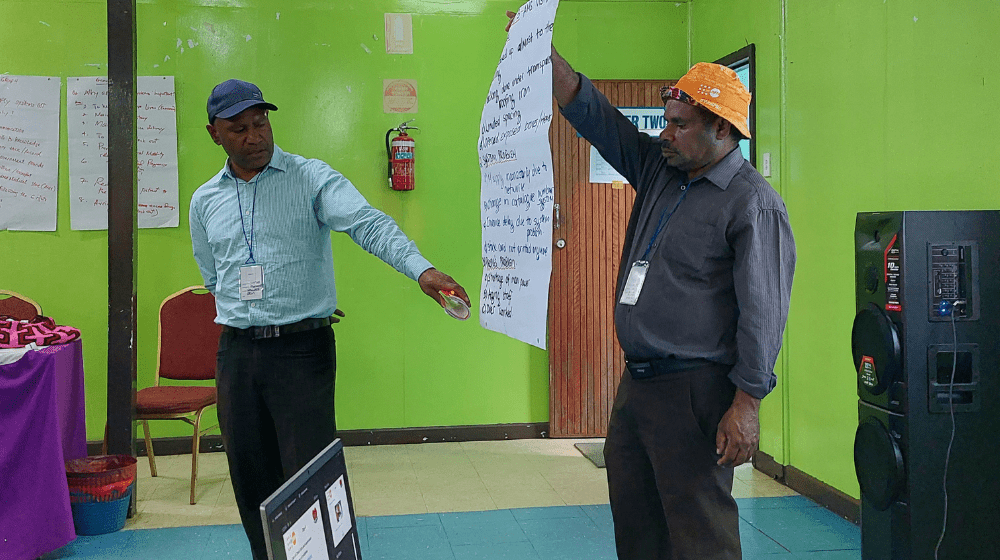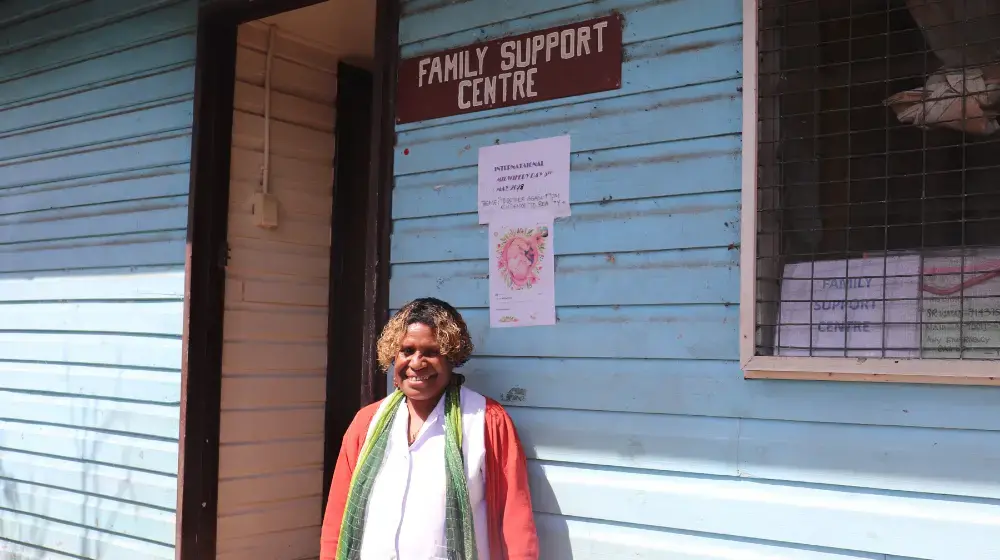In Papua New Guinea’s Southern Highlands Province, just 37% of women give birth with the support of a skilled health practioner. With women in labour faced with walking, sometimes for hours, to reach their nearest health facility, it can be understandable that many women would be reluctant to seek assistance. But reaching the facility is just one barrier. Whether the facility will have the resources to ensure a safe delivery is another challenge.
It is a challenge that health facility supply managers are using innovative solutions to solve.
“Supplies are the life-blood of the facility,” shares Mendi Hospital Pharmacy Manager Wallace Orivi. “Without the supplies, the health facilities are dead. We can have the building and we can have the staff, but without stock we have a big issue.”
According to UNFPA’s Health Facilities Survey 2022, 57% of facilities providing maternal health services had the global minimum standard of 7 maternal health medicines in stock at the time of the survey.
Wallace overseas the management of medicines, ensuring the hospital has enough supply for all patients while also preventing an overstock of medicines. Having too much of any one medicine in stock not only leads to wastage, as medicines may expire before they can be used, but may leave neighbouring short of stock.
“It is quite a challenge and it would happen all the time in the province,” he said. “There’s something that is in excess in one facility, and that is out of stock in another facility.”
Inventory Management Strategies Put Common Sense into Practice
Wallace was one of several Southern Highlands health practitioners who joined a specialised inventory management training in Mt Hagen, Western Highlands province, in March 2023. The training involved strategies for calculating the utilisation of medicines, preparing stock orders, and appropriate storage of medicines.
“A lot of the skilled learned in the training are common sense, but practitioners aren’t actually being taken through the steps and the process for managing medical supplies,” reflects Wallace. “It is relevant for all levels of health care.”
Though Wallace manages the stock for largest health facility in the province, he says the stock management strategies apply to any health facility, large or small.
“Some may think how you manage stock is different across levels of health care, but it is the same,” he says. “We all need the same basic management skills.”
WhatsApp Becoming a Communication Tool for Managing Stock Across Health Facilities
Wallace shared that after the training, communication between colleagues has been greatly improved.
“When we have a good channel of communication, we can help sort these out these stock challenges out and transport excess stock to where it is needed,” says Wallace.
The solution? A WhatsApp group.
“The WhatsApp group has really helped us,” he says. “When we communicate in the group, it helps us know where excess stock is, and where it needs to be moved. It helps us a lot.”
Wallace reported that stock-outs at the Provincial Hospital are quite rare. However, with one medical store processing a large quantity of orders from across the province, some facilities may need to wait up to four months to receive their orders. Managing stock between facilities is a simple solution to the immense logistical challenges and the pressure placed on the medical store.
Taking the Training to District Centres
After completing the training, Wallace returned to Mendi Hospital. He was eager to share the strategies he had learned during the workshop.
“When I came back, I made a visit to a district hospital, in the Kutubu area,” shares Wallace. “I spoke with the staff there who who managing medicine supplies and they had things all over the place. I actually delivered some of the training I had learned.”
“Two weeks later, I checked in. They were really fantastic! They had actually rearranged everything in the shelves. They sent me pictures and I thought ‘Man, this is really impressive’”.
“I wish this would happen in other facilities,” shares Wallace. “If other facilities can do what this district hospital did, the whole province will change.”
That change may not be far away.
“UNFPA has done a lot of training, especially in inventory management of medical supplies and in bringing people to understand the importance of effective supply management,” says Wallace, “Now, in partnership with the Provincial Health Authority, we are taking ownership of this training.”
“Health workers here are very receptive and are open-minded.”
Together with the PHA, Wallace is working towards a provincial inventory management training for district hospitals and health centres.
Reducing Maternal Mortality in the Highlands Region
To change the statistics on maternal mortality for the 5.6 million women and girls in Papua New Guinea, reaching the facility is just the first step. Ensuring that the staff of these facilities have access to the medicines and equipment they need to provide the best quality care is essential to ensuring every childbirth is safe.
UNFPA and Reproductive Health Commodities Security
UNFPA works with the National Department of Health (NDoH) to provide inventory management training for health care providers across Papua New Guinea. With support from the Australian Government, both UNFPA and NDoH are strengthening the capacity of facility staff to utilise the mSupply logistics system to prevent stock outs and wastage, ensuring essential medicines are available when and where they are needed.





